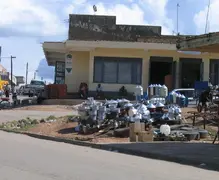
I help with a small Christian charity Afrinspire which sends computers and other aid to Uganda and similar places. In April people from that charity went to see projects supported in Uganda, and I tagged along to see Africa for the first time.
This wasn't a tourist trip - we didn't see gorillas in the mist, or other vistas of nature which I hope to see one day. But we did see Uganda from street level and got to meet Ugandans face to face. It was a real privilege to go there, and be welcomed so warmly by those I met.
Excuse an attempt at a stream of consciousness, or perhaps a Nile of consciousness.
My memories not a coherent whole. Instead scenes and sights and sounds and smells tastes into my thoughts tumble. Where start I? Above the clouds? Above the sands? Desert plain blank featureless snatches. Yet circles large circles written onto the dry expanse. Signs omens of? On the flight map names legends are displayed - Serengeti, Nile, Lake Victoria. I am being borne towards someone else's world.
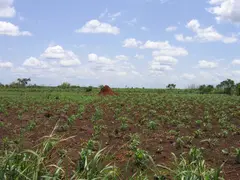
Masindi. Poor desperately poor village. Red termite mounds and round thatched huts swell in the fields and scrubland. Despite disease and strife they smile true joy. Despite difficulties getting education they're not stupid, they're trying to help each other. Despite (or due to) the poverty they generously press hats and sieving bowls and chickens on us. The chickens foul up (pun jest joke) the back of one of the jeeps on the long way back to Kampala.
A slanting line across the road. Circles you can stand in and be photographed. Pretty official looking certificates to buy since crossing equator. Dubious demonstration of water swirling different ways down plugholes north south of line. Sham ebony and rosewood artifacts for sale. Yellow weaver birds ignoring all this and climbing in and out of their nests.
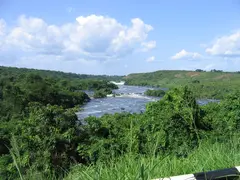
The White Nile. Wide waste of tumbling water. Too wide to photograph. Just look at wide-eyed, thinking of Speke. Our soldier escort carries his AK47. The Ugandan army on the cliffs above the bridge. To the north of us somewhere the LRA. Sudan some say. On the way to Karuma Falls we met a military roadblock. Disconcertingly diverted into an army barracks. Before we were allowed to see the falls.
My homeland reaches out for me even here. Amid the traffic fume chaos of Kampala Sams restaurant caters for us - the avocado milk shake and crocodile fillet taste. The TV at the Kolping Guest House shows Norwich beating Man Utd as we dine on omelettes. Franco unknowingly plays the song Virginia chose for us to dance to.
Katuna Border. The middle of nowhere, neither Uganda nor Rwanda. Beggars haunt one - to give not to give? Large tankers motor on past. Incoherent stories from want-to-be-friends strangers. A strange cartel - the money changers clad in green coats.
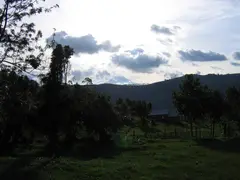
Up on the roof of the world with mountains quilted by sorghum fields. The stars blaze so bright at midnight, Orion's belt is burnished. A volcano in Rwanda crowned in mist. They stamp out a Rikiga dance in the near dark from a charcoal stove in Guster's house.
Words and languages fascinate me, and Uganda was a rich confluence of tongues. English is the common and the official language, but there are forty languages spoken in different areas. I didn't pick much up - one or two words in Swahili (a trade language which originated in contact between Africans and Arab traders.) Swahili is the official language of Kenya (we flew on Kenyan Air) and Tanzania, but not Uganda.
It was difficult to find postcards in Uganda (tourism is still an adventure,) one I did find had an elephant on it with Jambo (Swahili for hello.) Thanks is Asante, thanks a lot is Asante sana (Os and As sounded rather close to me.) Going around one heard Mzungu a lot (pronounced Musungu means white man), the plural is Bazungu. Mzee (said musay) means respected elder. The Bakiga people speak Rikiga (the K here is a "ch" in sound but in Kabale it's a "k".)
Two-wheeled vehicles are boda-bodas. I was told boda is a corruption of the English word "border" in the Luganda language, and boda-bodas were used for travelling the "border". We were in the second biggest city in Uganda called Mbarara during an election. A vivid candidate was Lawrence, the boda-boda man, whose campaign centred on how few jobs there are (even Ugandans with jobs often have to moonlight too.) His motivated supporters raced around on motorbikes and the backs of trucks, making their voice heard.
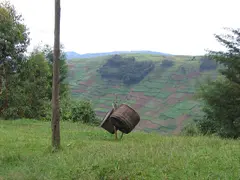
Ugandans are less slaves to the clock than we are, perhaps partly due to not all having watches and timepieces? The mountain area (Rwancerere) we stayed in had drums which served to tell the villagers it was time for Church or suchlike, depending on the rhythm beaten out. The school bell was an old car inner wheel, quite melodic. You see old cars and buses in various states of decay around the place.
The evening agenda is pre-supper then wash then tea then bed. A necessary hand washing ritual comes before eating with hot water poured over your hands and a bar of soap in the bowl. Water does not come out of taps (one duty of the children is to fetch water from boreholes or dubious springs or bottom of mountains,) and so Ugandans are frugal with using water. I didn't master body washing in a bowl. Hotels etc provide slip-ons to wear in the washrooms. Mental and physical flexibility come in handy for the toilet arrangements.
Newspapers are sold stapled (so you know you're getting an unread edition.) Ugandans are a warm people, you can see boys and girls holding hands with each other without it meaning anything more. Handshakes often seemed to involve interlocking the thumbs. Applause in Masindi was clap three times, then clap three times more, then clap again this time ending with sliding one hand off and a high-pitched keening.
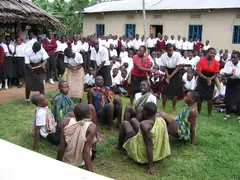
We got to sign loads of visitor books, listen (and make) speeches, and be entertained by singing and dancing. We were white people, this was formal protocol, they were in many cases acknowledging help given, but I also sensed a Ugandan way of doing things - a way of respecting people we have lost in the West. The singing and dancing was impressive, they all seemed to have a genetic sense of tempo. Especially moving and memorable were the young people at Shuuku Vocational College (a very demanding Acholi dance,) and the very different Batwa (pygmy) dance.
Education particularly vocational education is high on the agenda. Parents want their children to go to school, and the children want to go. The style of teaching is to the West antiquated, and the dormitories at boarding schools can be very cramped, but there is a desire to learn which is the important thing. Equipment and books are in short supply so chemistry may be less practical and more rote learning of "-ate" means an oxygen compound and "-ite" a sulphite one.
Christianity is very evident in Uganda, Islam to a lesser extent. Christian slogans on the backs of cars, stores called "Divine Ebenezer Cake Shop", cabinet ministers quite happy to sing hymns in public. Schools are often of a religious foundation, the Church in Uganda performs a real service to the community. It does have challenges like polygamy - this is dealt with pragmatically by controlling the level of integration into the Church.
Where there are (some) tarmac roads there are also perilous potholes and savage sleeping policemen. Often it's dirt track (a very rutted one going up the mountains to Rwancerere.) Uganda is very dusty but paradoxically people seem to dress as if they were going to a party. You do see colourful scenes as one drives around from the variegated pyramids of fruit to the schoolchildren like flowering bulbs in an English spring. Primary school children wearing bright primary colours.
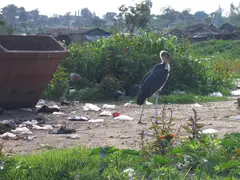
Kampala is a traffic nightmare with dire air quality and weaving matutus (minibus taxis) and suicidal motorcyclists. Speaking of night don't drive during it - daytime is bad enough with cyclists careering everywhere but at night you get overladen lorries driving without lights to avoid being stopped. Government cars have red licence plates. The law is based on English law.
Stones and gates and loofahs and plush armchairs and wood and fruit are piled by the roadside for sale. And coffins too - life expectancy here is in the low thirties, and infant mortality high (children not talked about until 1 year old.) You see a lot of charcoal bags for sale or being transported dangerously on lorries - charcoal is used for cooking and heating in stoves with faces. So much charcoal that the forests are in danger and the government has started forest planting programmes.
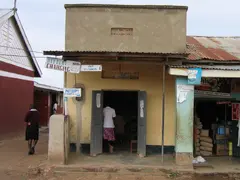
Even places with electricity have regular power cuts. When night comes in the mountains it is really night - you retreat around the charcoal stove for warmth and the stars blaze forth. Ugandans make their own bricks in hundreds of brick kilns - no planning permission needed here. Buildings range from grass huts through cattle dung and murum (clay?) walls to brick buildings.
At least the land is green and many things grow here. No need for the boom irrigation schemes we saw passing over the Libyan desert. Those were the strange circles - vast booms turned by the pressure of water pumped out into the aridness thanks to oil money.
Don't come to Uganda if bananas make you bilious. There's at least five different kinds here, ranging from the small yellow ones with a strong flavour to the green ones which get fried (in the leaves) and mashed into the staple matoke. Fruit is plentiful and fresh here - mangoes and papayas and pineapples and oranges (green as they should be.) Beekeeping is popular - there's a belief in some parts that the beeswax at a nest entrance helps against AIDS.
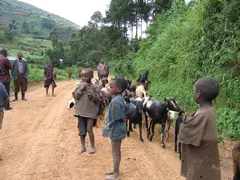
Goat meat is on the menu - goats and sheep are herded together and it's difficult to tell them apart. Sheep tails go downwards, goat tails go upwards. Grasshoppers are also on the menu - wished I had a picture of the UFO like spotlight clusters which trapped grasshoppers in nets. One menu had "chaps" on it which proved to be flat battered sausage meat.
All in the party had upset stomachs at one stage or other. After my dose I ate sparingly and carefully but I did try the sorghum "porridge". This brown fermented Ugandan male drink is an acquired taste - potent but potently sour. There's a millet "porridge" too (inferior I was told.) Oh and millet bread which is like chestnut stuffing. Africans use hot milk with tea, hot milk rather than water. Everything goes into the kettle making tea a different experience to what teabags give. There weren't many young men in the mountain village we stayed in - away working on the tea plantations.
Uganda has a wide range of terrains from rainforest to red desert scrubland to cooler mountain regions. Some of it reminded me of England's green and pleasant land, and it was green and lush (I was there during the wetter half of the year - lying on the equator there's just two seasons a wet and a dry.) When it rains it really pours and thunders.
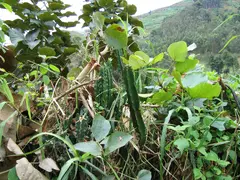
In the mountainous south saw what looked like cacti but were Candelabra trees (Euphorbia candelabrum.) Put that against what they called eggplants which were definitely not aubergines (they did look like eggs.) Or the pumpkin which Pastor Guster auctioned at the end of the service in Rwancerere (more a white gourd.) Many people are subsistence farmers and live without earning or spending - so church collections includes fruit and vegetable which get auctioned as part of the proceedings.
As one drives along you will see lots of red bougainvillea, or mauve jacaranda, or white and yellow arum lilies (moon flowers?) grown to attract bees. Or see Hathor-like longhorn cattle grazing by papyrus beds, or glossy sacred ibises, or yellow weaver birds climbing up into their nests, or see the gross Malibu storks scavenging. And you may hear the sibilant whistling thorn trees (I kid you not.)

It was the smaller lifeforms I was worried about, and I gratuitously applied eucalyptus based insect repellent and tried to use mosquito nets. Mosquitoes were only really noticeable in the Lake Victoria area, and tsetse flies were further north. I took malarone against malaria, and was careful about water used for drinking and cleaning teeth.
In passing there are albinos here and their lot is not pleasant. Whether it's genetic, or having no protection against a strong sun, nonetheless they're often blind and disabled. Polio and clubfeet are problems, together with amputation being a simpler treatment if you have poor medical facilities.
Uganda is a poor country full of need. What we wouldn't miss from our bank accounts will make a big difference there. We can so easily make a difference to them, support them, give them hope. Going there made me think about aid, the questions to be answered about aid.
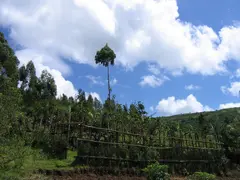
Why? This is the question to start with, I'm not being jocular. Why give aid? One might give aid because one feels guilty. It'll take more than putting a coin into a tin to erase guilt. One might give aid because sympathy is awakened by a moving picture on the TV. A good why but good also to strengthen and deepen the why of aid by tying to one's core beliefs. If those core beliefs are Christian then one can go right back to the Old Testament for there should be no poor among you, or leave gleanings for the widows and aliens.
What to aid? There is a kind of aid which only 'satisfies' the donor. A lot of aid sadly falls into this category. There's palliative aid which improves things - for the short-term. Best is unattractive long-term, low-key aid helping people like the Ugandans help themselves. Ugandans are not stupid, they're trying things like different crops and tree grafting, they're trying to get their communities working together. They'll come up with ideas appropriate for their situation rather than what we might suggest.
How to aid? It's difficult to tell from the UK how much good one's donation is really doing. It was a privilege to go, to be part of the party thanked for sewing machines and computers and books and chemistry equipment and plaster of paris and money for corrugated roofs. But in terms of judging where to put aid, how well aid is acting, I would rely on local Ugandans. As a msungu (white man) one cannot but affect what you're observing. There is a real danger of a Potemkin village effect. Or of using aid to buy appreciation. The decisions about where to put aid are almost life and death decisions. That's too close to playing God for me.